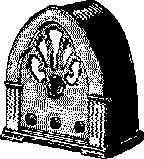GEORGE ABRAHAM
Today’s IBS is the Product of his Enthusiastic Spirit
Dr. George Abraham, Ph.D. – Founder – Intercollegiate Broadcasting System, Inc.
That college radio is where it is today and how it got there were not pre-ordained at the Big Bang. There were many hands on the tiller, but the biggest – physically and spiritually – at the beginning was Dr. George Abraham’s. Advancement of college radio was one of the many interests to which he consistently devoted a significant part of his diverse life from his matriculation at Brown University in the Fall of 1936 to his death in 1995 at age 77. To his colleagues in college radio he was not only an inspiration but a friend.
The origins of college radio were neither prepossessing nor prescient. George roomed in Caswell Hall, and his classmate Dave Borst roomed in Littlefield Hall, two freshman dormitories about a quarter-mile apart. They linked their rooms by an audio line in order to exchange programming and other communications. The first “broadcast” was November 30, 1936. Other classmates in other buildings asked to be hooked in; additional lines were added to permit additional originating venues. As the equipment in his room expanded, George made his roommate move into the smaller of the two rooms, and George moved his studying to the basement. By the time they graduated The Brown Network had emerged, complete with low-power radio-frequency translators fed from the master control room in George’s room in Slater Hall on College Hill.
After the New England Hurricane of 1938 took down most of the aerial plant, many of these translators were fed by lines in the University’s steam tunnels. That was the basis of the popular moniker for college radio, “The Gas Pipe Network.” Dave oversaw the technical expansion, but the master control room remained with George in Slater Hall until the Network moved into Faunce House in 1938. Dr. David Sarnoff, President of RCA, which then held most of the major domestic radio patents and owned the Blue Network (NBC – the then-be-chimed National Broadcasting Company), broadcast during a visit to these studios in the Fall of 1939. The photo caption in the Providence Journal read, “RCA Head Broadcasts over ‘Rival’ Network.”
Faunce House was the site at which George convened the founding convention for the Intercollegiate Broadcasting System in February of 1940. Representatives from Columbia, Cornell, Dartmouth, Harvard, M.I.T., Pembroke, Rhode Island State, University of Connecticut, University of New Hampshire, Wesleyan, and Williams attended. As founder of the Brown Network George was elected the first President of IBS and later its first Chairman of the Board. After graduation, George got his masters degree at Harvard, his Ph.D. at the University of Maryland, and pursued post-doctoral studies at Harvard and M.I.T. He went to work ultimately at the Naval Research Laboratory in Washington, D.C., receiving many awards and patents over forty-five years, finally retiring as a research physicist.
It was George who pulled together a large panel of distinguished alumni to testify before the Federal Communications Commission after the Second World War in favor of reserving the twenty channels in the new, higher FM broadcast band. He assisted in IBS’ attempts to resist the raid on these frequencies in the ‘70s by the public broadcasters. Always looking ahead technologically, George attempted to get educational reservations on geostationary satellites for distribution of educational programming.
George moved in wide circles in Washington. Most everybody he came in contact with remembered the smart, free-thinking, personable, and interesting extrovert. He was a friend of the late Rosel Hyde, a long-time FCC commissioner and chairman of the FCC, and a neighbor of Commissioner Robert Lee, another long-time FCC commissioner and chairman. He served as president of the Washington Academy of Sciences and the Washington Society of Engineers. He retired as a captain in the U.S. Naval Reserve.
For years, George interviewed high school seniors applying for admission to Harvard College. More than once he helped IBS staffers with their end-of-term catch-ups in coursework. When his children got a llama as a backyard pet, he procured Shasta an official photo ID for admittance to the Naval Research Labs – those were the days of kinder and gentler security. He and his family were outdoor enthusiasts, and more than one IBS board meeting in the ‘60s concluded with an after-dark arrival on foot at some remote cabin or lean-to along the Appalachian Trail.
George’s life-long leadership and support of IBS surely derived from his relaxed anticipation and enthusiastic embracing of change. GA never seemed unduly concerned by seeming impracticalities that would have deterred a lesser man.
![]()
This obituary of Dr. Abraham was written for the IBS website in 2006 by William Malone, Washington counsel and a former President of IBS, who gave the remembrance of Dr. Abraham on behalf of college radio at the memorial service at the Cosmos Club in Washington, D.C., in 1995. References for the obituary included the books by Louis M. Bloch, Jr., a member of the Brown Class of ‘40 and the first business manager of IBS, The Gas Pipe Networks: a History of College Radio 1936-1946 (Cleveland 1980), and by Jesse Walker: Rebels on the Air: an Alternative History of Radio in America (N.Y.U. Press 2001), The Washington Post, and sources at Brown University.
0011491 – George Abraham – IBS Website obituary
